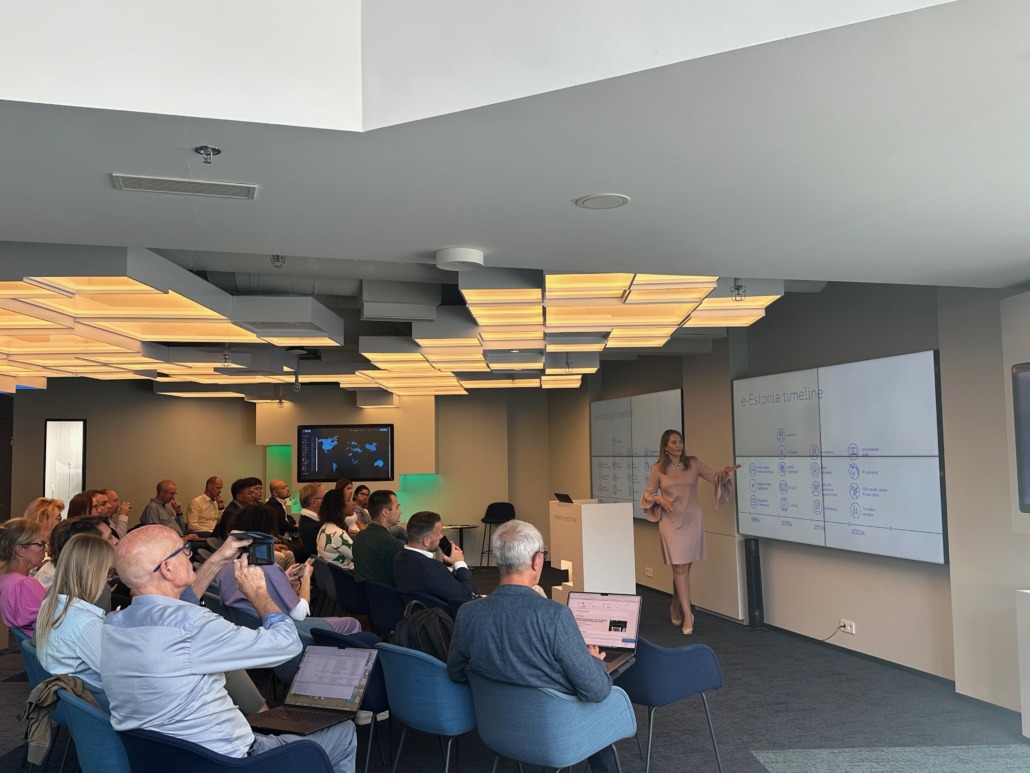Highlights of the Estonian Health Tech Week 2024
From August 26-29, Tartu Biotechnology Park hosted the second annual Estonian Health Tech Week, a four-day celebration of innovation, technology, and digital transformation in healthcare. Attendees had the opportunity to explore the full spectrum of Estonia’s e-health, health tech, biotech, and healthcare ecosystem.
We were delighted to welcome a diverse group of participants from across Europe and beyond, including startups, hospital representatives, policymakers, and investors. This gathering provided a unique opportunity for them to engage with Estonia’s health tech landscape, share insights, and initiate collaborations aimed at shaping the future of health and care.
 DAY 1: EXPLORING E-HEALTH AND ESTONIAN ECOSYSTEM
DAY 1: EXPLORING E-HEALTH AND ESTONIAN ECOSYSTEM
The first day of Estonian Health Tech Week kicked off with an introduction to the event and the local health tech ecosystem at the E-Estonia Briefing Centre. Attendees had the chance to gain insights into Estonia’s e-health landscape, setting the scene for the week ahead.
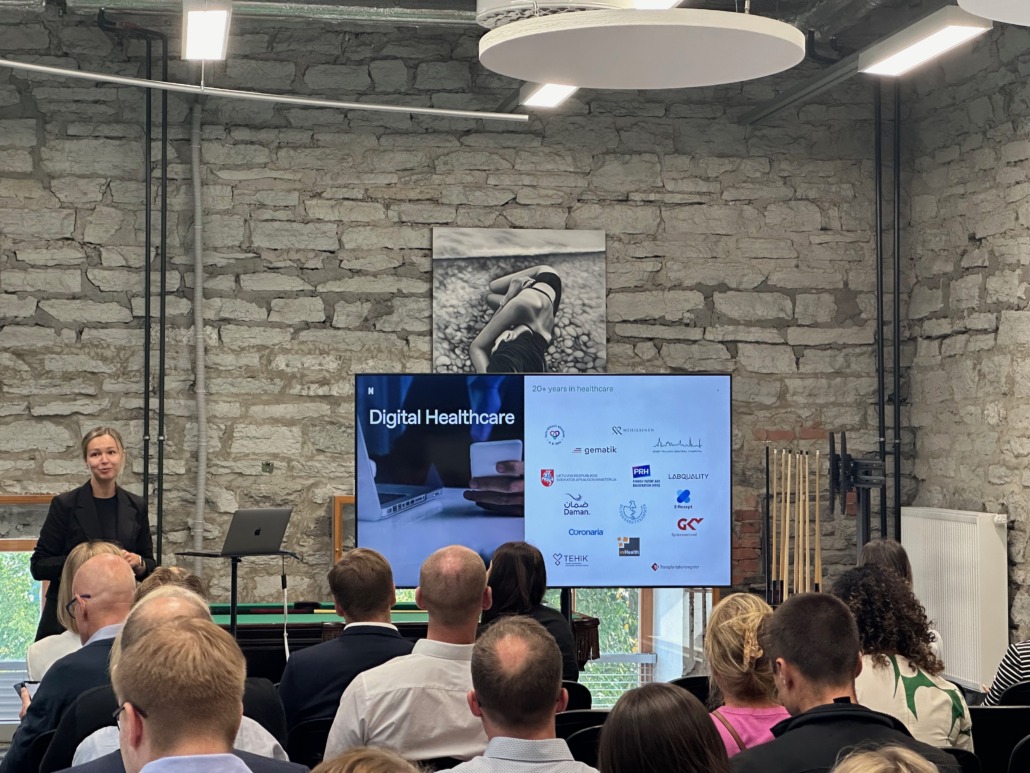 The morning sessions included an in-depth look at the development and integration of healthcare systems, with a particular focus on AI’s potential in healthcare. Kertti Merimaa from Nortal introduced the current state and future of healthcare information systems, while Tõnis Jaagus from TEHIK detailed the functionality and value of Estonia’s Health Information System (TIS). Taavi Annus from the Health Insurance Fund gave an overview of the national e-health services and their impact, followed by Elena Sügis from Nortal, who explored the opportunities and risks associated with AI in healthcare.
The morning sessions included an in-depth look at the development and integration of healthcare systems, with a particular focus on AI’s potential in healthcare. Kertti Merimaa from Nortal introduced the current state and future of healthcare information systems, while Tõnis Jaagus from TEHIK detailed the functionality and value of Estonia’s Health Information System (TIS). Taavi Annus from the Health Insurance Fund gave an overview of the national e-health services and their impact, followed by Elena Sügis from Nortal, who explored the opportunities and risks associated with AI in healthcare.
 In the afternoon, the focus shifted to digital health, addressing current challenges, bottlenecks, and opportunities for growth. Presentations from TalTech, Health Founders, Tehnopol, and Tartu Biotechnology Park highlighted the importance of stakeholder involvement in developing the health tech landscape. The day concluded with a panel discussion on bridging the gap between healthcare professionals and technological transformation, moderated by Kadi Lubi from TalTech and attended by Member of the Estonian Parliament Andres Sutt, Deputy Chancellor of the Ministry of Social Affairs Nele Labi, family doctor Laura Prett and Priit Kruus from Dermtest.
In the afternoon, the focus shifted to digital health, addressing current challenges, bottlenecks, and opportunities for growth. Presentations from TalTech, Health Founders, Tehnopol, and Tartu Biotechnology Park highlighted the importance of stakeholder involvement in developing the health tech landscape. The day concluded with a panel discussion on bridging the gap between healthcare professionals and technological transformation, moderated by Kadi Lubi from TalTech and attended by Member of the Estonian Parliament Andres Sutt, Deputy Chancellor of the Ministry of Social Affairs Nele Labi, family doctor Laura Prett and Priit Kruus from Dermtest.
Day 2: INNOVATION AT TARTU UNIVERSITY HOSPITAL
The second day of the Estonian Health Tech Week featured a comprehensive visit to Tartu University Hospital, focusing on the hospital’s innovation capacity, cooperation models, and testbed experiences.
Joel Starkopf, the Head of Research and Development, kicked off the day with an insightful presentation on the hospital’s innovation capacity and various cooperation models. His discussion highlighted how Tartu University Hospital fosters collaboration with various stakeholders to drive advancements in health tech.
 Rainis Kolga, Head of Digital Services, and Richard Jalakas, Project Manager at Digital Services, provided examples to illustrate expectations to testbed versus the actual outcomes. They shared lessons learned and the practical challenges encountered in implementing projects.
Rainis Kolga, Head of Digital Services, and Richard Jalakas, Project Manager at Digital Services, provided examples to illustrate expectations to testbed versus the actual outcomes. They shared lessons learned and the practical challenges encountered in implementing projects.
The afternoon included presentations from companies showcasing successful collaborations with Tartu University Hospital:
Peeter Padrk, CEO and Oncologist at Antegenes discussed the company’s innovative approaches in cancer genetics and their partnership with the hospital. Karin Kogermann, CEO and Co-Founder of Esadres presented her company’s contribution to healthcare innovation by developing personalised wound care products and their collaborative efforts with the hospital.
After the presentations, the attendees were given a tour of the hospital, highlighting its newest innovations and technological advancements.
The day concluded with a presentation from Mart Ustav, founder and CEO of Icosagen. His talk focused on pioneering biotechnology and drug development, shedding light on cutting-edge research and development in the field. Attendees went on an excursion to Icosagen.
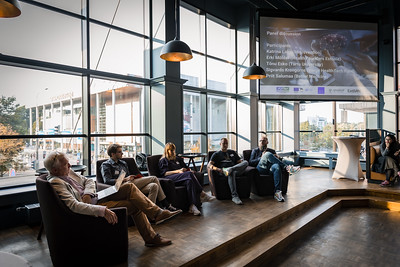 The second day ended with a matchmaking event, EstBAN Tartu x DeepTech Pub – Health Edition, organised in collaboration with EstBAN, Sparkup Tartu Science Park, Startup Estonia, and Tartu Biotechnology Park. The gathering, held at Humal in Tartu, brought together prominent investors, innovative founders, and key ecosystem members to discuss the future of health tech and biotech investments.
The second day ended with a matchmaking event, EstBAN Tartu x DeepTech Pub – Health Edition, organised in collaboration with EstBAN, Sparkup Tartu Science Park, Startup Estonia, and Tartu Biotechnology Park. The gathering, held at Humal in Tartu, brought together prominent investors, innovative founders, and key ecosystem members to discuss the future of health tech and biotech investments.
The meetup began with a short keynote address from an investor, followed by an engaging panel discussion between founders and investors. Erki Mölder, Managing Partner at Verge HealthTech Fund, moderated the panel, with Tõnu Esko, Vice-Rector, Professor, and long-time senior management member at Estonian Biobank, Sigvards Krongorns, Associate at Verge HealthTech Fund & Co-Founder at CastPrint, Priit Salumaa from Better Medicine, and Katrina Laks from Migrevention serving as panellists.
The moderator utilized an interactive voting system, and panellists participated in a round of yes-no questions on intriguing statements, adding excitement to the proceedings.
DAY 3: DTx NEW NORDICS
The DTx New Nordics Conference 2024 on the third day of Estonian Health Tech Week, brought together innovators, policymakers and industry leaders to explore the future of digital therapeutics.
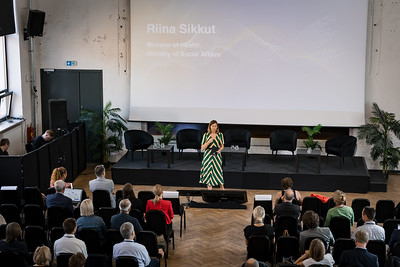 The day started with a keynote from the Minister of Health Riina Sikkut who highlighted that although Estonia continues to lead the way in e-health, the future holds new challenges. One of the key debates regarding implementing the EHDS in the following years is the patient’s right to opt out of sharing health data—a choice that could limit opportunities in personalised medicine and developing digital solutions. As we move forward, open discussions are crucial to balancing individual rights and public health benefits. Standardised, high-quality data will be essential in driving progress in research, personalised care, and pharmaceuticals.
The day started with a keynote from the Minister of Health Riina Sikkut who highlighted that although Estonia continues to lead the way in e-health, the future holds new challenges. One of the key debates regarding implementing the EHDS in the following years is the patient’s right to opt out of sharing health data—a choice that could limit opportunities in personalised medicine and developing digital solutions. As we move forward, open discussions are crucial to balancing individual rights and public health benefits. Standardised, high-quality data will be essential in driving progress in research, personalised care, and pharmaceuticals.
 The next session was introduced by a keynote speech by Jaanika Merilo (Head of eHealth Strategy at the Ministry of Social Affairs), who highlighted Estonia’s progress and goals for implementing the European Health Data Space (EHDS), which will come into force in late 2024. Due to existing infrastructure, Estonia plans to move ahead faster than the EU’s target. The EHDS will empower patients to control their data while ensuring it is accessible for cross-border healthcare and research, though current challenges include fragmented and non-standardized data. A streamlined one-stop-shop process for data access is in development, along with tools for developers and a Europe-wide validation system. Estonia is also working on an e-health strategy, involving collaboration between the government, private sector, and research groups. Jaanika Merilo emphasised the importance of collaboration, innovation, and the need for patient-centric solutions in implementing the EHDS.
The next session was introduced by a keynote speech by Jaanika Merilo (Head of eHealth Strategy at the Ministry of Social Affairs), who highlighted Estonia’s progress and goals for implementing the European Health Data Space (EHDS), which will come into force in late 2024. Due to existing infrastructure, Estonia plans to move ahead faster than the EU’s target. The EHDS will empower patients to control their data while ensuring it is accessible for cross-border healthcare and research, though current challenges include fragmented and non-standardized data. A streamlined one-stop-shop process for data access is in development, along with tools for developers and a Europe-wide validation system. Estonia is also working on an e-health strategy, involving collaboration between the government, private sector, and research groups. Jaanika Merilo emphasised the importance of collaboration, innovation, and the need for patient-centric solutions in implementing the EHDS.
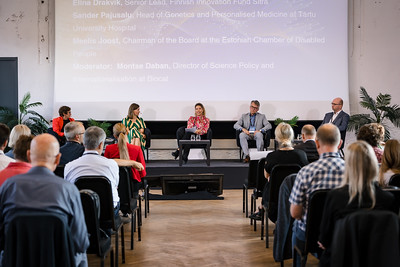 In the first panel led by Montse Daban, the experts discussed key aspects of the European Health Data Space (EHDS). The expert panel featured Riina Sikkut, Elina Drakvik (Sitra), Meelis Joost (Estonian Chambre of Disabled People) and Sander Pajusalu (Tartu University Hospital). The importance of translating digital health innovations into immediate patient benefits was strongly emphasised. Clear communication across stakeholder groups is essential to unlocking the full potential of the EHDS. Seamless data access was identified as a key priority, while concerns around data security and accuracy were also addressed, underscoring the need for trust in digital health solutions.
In the first panel led by Montse Daban, the experts discussed key aspects of the European Health Data Space (EHDS). The expert panel featured Riina Sikkut, Elina Drakvik (Sitra), Meelis Joost (Estonian Chambre of Disabled People) and Sander Pajusalu (Tartu University Hospital). The importance of translating digital health innovations into immediate patient benefits was strongly emphasised. Clear communication across stakeholder groups is essential to unlocking the full potential of the EHDS. Seamless data access was identified as a key priority, while concerns around data security and accuracy were also addressed, underscoring the need for trust in digital health solutions.
The second session explored the main challenge of bringing Digital Therapeutics (DTx) tools to market: reimbursement. Experts discussed existing reimbursement models across Europe, focusing on how they align with the Medical Device Regulation (MDR), and how they can support DTx providers.
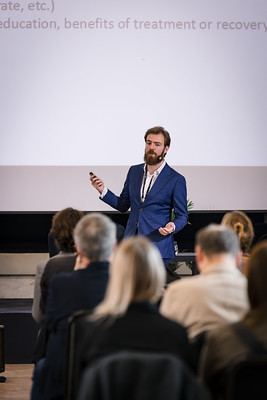 Keynote speaker Robin van Kessel provided insights on financing digital health technologies. He highlighted that current reimbursement models do not align well with digital health technologies (DTx). He emphasized the need for outcome-based financing and comprehensive value frameworks to better integrate DTx. Overcoming barriers will involve stakeholder engagement, real-world evidence, and distinguishing digital therapeutics from other innovations for lasting impact.
Keynote speaker Robin van Kessel provided insights on financing digital health technologies. He highlighted that current reimbursement models do not align well with digital health technologies (DTx). He emphasized the need for outcome-based financing and comprehensive value frameworks to better integrate DTx. Overcoming barriers will involve stakeholder engagement, real-world evidence, and distinguishing digital therapeutics from other innovations for lasting impact.
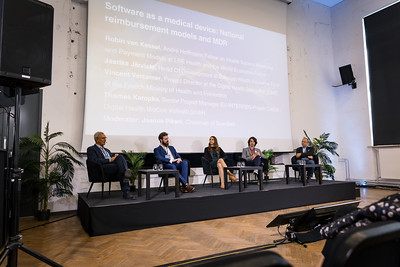 The panel discussion, moderated by Jaanus Pikani, featured Jaarika Järviste from the Estonian Health Insurance Fund, Vincent Vercamer from the French Ministry of Health and Prevention, and Thomas Karopka from BioCon Valley, and Robin Van Kessel, who shared their experiences and highlighted the need for developing optimal reimbursement pathways for DTx solutions. The panellists highlighted that the financing of Digital Therapeutics (DTx) has faced challenges due to limited public funding and other hurdles, raising questions about how they should be treated compared to traditional medicine. While a straightforward approach might suggest treating them similarly, it’s crucial to direct attention to these new solutions and implement them effectively. To truly improve patient care, we must focus on how DTx can enhance healthcare workflows as well as documentation, adapting to evolving demographics and increasing life expectancy.
The panel discussion, moderated by Jaanus Pikani, featured Jaarika Järviste from the Estonian Health Insurance Fund, Vincent Vercamer from the French Ministry of Health and Prevention, and Thomas Karopka from BioCon Valley, and Robin Van Kessel, who shared their experiences and highlighted the need for developing optimal reimbursement pathways for DTx solutions. The panellists highlighted that the financing of Digital Therapeutics (DTx) has faced challenges due to limited public funding and other hurdles, raising questions about how they should be treated compared to traditional medicine. While a straightforward approach might suggest treating them similarly, it’s crucial to direct attention to these new solutions and implement them effectively. To truly improve patient care, we must focus on how DTx can enhance healthcare workflows as well as documentation, adapting to evolving demographics and increasing life expectancy.
 The third session delved into the integration of AI in Digital Therapeutics (DTx), highlighting the opportunities and challenges this brings for providers. In his introductory keynote speech, Thomas Karopka emphasised that AI adoption in healthcare remains slow, with hospitals needing structured support to integrate these cutting-edge technologies. One of the key challenges is the disconnect between industry developers and clinical needs. This gap is the main barrier to creating AI solutions that are both effective and compliant with medical regulations. Bridging this gap, along with a strong focus on change management and strategic implementation, is crucial to ensure the successful uptake of AI in healthcare.
The third session delved into the integration of AI in Digital Therapeutics (DTx), highlighting the opportunities and challenges this brings for providers. In his introductory keynote speech, Thomas Karopka emphasised that AI adoption in healthcare remains slow, with hospitals needing structured support to integrate these cutting-edge technologies. One of the key challenges is the disconnect between industry developers and clinical needs. This gap is the main barrier to creating AI solutions that are both effective and compliant with medical regulations. Bridging this gap, along with a strong focus on change management and strategic implementation, is crucial to ensure the successful uptake of AI in healthcare.
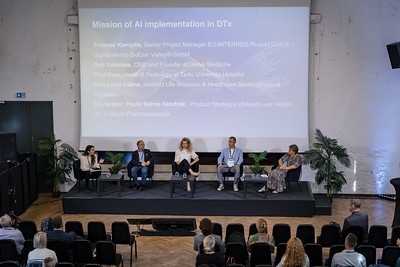 A panel moderated by Paula Salme Sandrak explored best practices and perspectives from healthcare, technology, and law. The expert panel featured Lise-Lotte Lääne (Sorainen), Pilvi Ilves (Tartu University Hospital), Thomas Karopka (BioCon Valley) and Priit Salumaa (Better Medicine). One of the takeaways of the panel was that the process of adopting AI in healthcare is slow, largely due to a lack of workforce and tools, as well as complex regulatory requirements. While doctors are eager for AI to assist with routine tasks, fully autonomous solutions remain out of reach. The fragmented AI market, especially in radiology, faces consolidation as startups compete for funding. Procurement processes and niche AI solutions prevent widespread adoption. As Europe’s innovation landscape is heavily regulated, a more flexible framework could accelerate progress. A mindset shift is needed to build trust and integrate AI into healthcare systems effectively.
A panel moderated by Paula Salme Sandrak explored best practices and perspectives from healthcare, technology, and law. The expert panel featured Lise-Lotte Lääne (Sorainen), Pilvi Ilves (Tartu University Hospital), Thomas Karopka (BioCon Valley) and Priit Salumaa (Better Medicine). One of the takeaways of the panel was that the process of adopting AI in healthcare is slow, largely due to a lack of workforce and tools, as well as complex regulatory requirements. While doctors are eager for AI to assist with routine tasks, fully autonomous solutions remain out of reach. The fragmented AI market, especially in radiology, faces consolidation as startups compete for funding. Procurement processes and niche AI solutions prevent widespread adoption. As Europe’s innovation landscape is heavily regulated, a more flexible framework could accelerate progress. A mindset shift is needed to build trust and integrate AI into healthcare systems effectively.
DAY 4: SEMINAR: CREATING VALUE THROUGH HEALTH DATA
The fourth and final day of Estonian Health Tech Week focused on the European Health Data Space (EHDS) and featured three insightful panel discussions. The day began with a warm welcome from Mart Maasik, who set the scene by exploring the pivotal role deep tech investors play in advancing innovation. His discussion highlighted the speed of intellectual property (IP) transfer, which can range from as fast as 30 minutes to as long as five years.
A key takeaway was that commercial capability is the true differentiator. It’s not just about owning IP but about who can act on it and transform it into commercially viable, real-world solutions. UniTartu Ventures and Estonian Multiomics Company (EMC) were introduced as examples of entities driving such innovation by turning academic advancements into practical outcomes.
This set the tone for the day’s deep dives into the challenges and opportunities of implementing the EHDS.
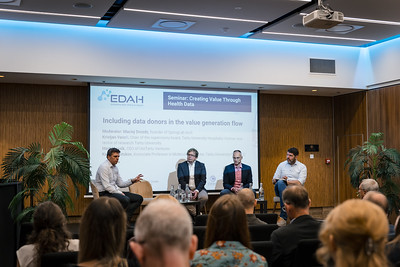 The first panel focused on the value generation flow for data donors and the transformative potential of using data for healthcare innovation.
The first panel focused on the value generation flow for data donors and the transformative potential of using data for healthcare innovation.
Moderator Maciej Drozdz, founder of SpringLab.tech, guided the speakers towards exploring new perspectives. The expert panel featured Kristjan Vassil, Chair of the supervisory board at Tartu University Hospitals/ Former vice rector of research at Tartu University, Mart Maasik, CEO of UniTartu Ventures, and Kaarel Krjutskov, Associate Professor in Molecular Medicine at Tartu University/Competence Centre on Health Technologies. The panel emphasized that data’s true value lies not merely in its collection, but in how it is analyzed and applied. The real potential is unlocked when data is combined with innovative ideas and practical tools, though creating incentives for data donors remains a challenge.
Human-centricity was a key theme, with panellists underscoring the importance of creating value that goes beyond technology to meet the needs of data donors. Maintaining strong, engaging relationships with donors is crucial for their continued participation.
The conversation also tackled the ethics and ownership of data. It was noted that while individuals don’t truly “own” their data, it’s essential to balance participation with transparency, access, and value-sharing to ensure fairness and trust.
Finally, the panel discussed the ongoing barriers to fully integrating biobanks into healthcare systems, despite technological advancements. Bridging the gap between donors and healthcare requires systems that not only promise health benefits but also deliver on that promise.
As we look to the future, integrating donors into the value-creation process while maintaining ethical standards and sustainability is essential. By building strong connections between data, donors, and healthcare innovation, we can drive meaningful progress.
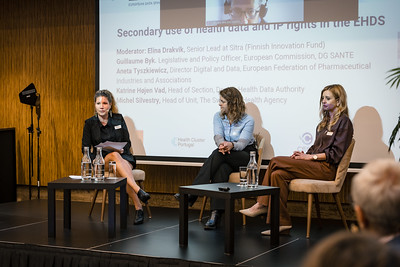 The second panel about the secondary use of health data and IP rights in the EHDS was held by Elina Drakvik, Senior Lead at Sitra (Finnish Innovation Fund). The expert panel featured Guillaume Byk, Legislative and Policy Officer at the European Commission, DG SANTE; Aneta Tyszkiewicz, Director of Digital and Data at the European Federation of Pharmaceutical Industries and Associations; Katrine Højen Vad, Head of Section at the Danish Health Data Authority; and Michel Silvestry, Head of Unit at the Swedish eHealth Agency. It brought key themes of collaboration, governance, and IP rights into focus, addressing the delicate balance between accessibility, privacy, and public trust. The conversation also highlighted the innovation opportunities that EHDS could bring to healthcare systems across Europe.
The second panel about the secondary use of health data and IP rights in the EHDS was held by Elina Drakvik, Senior Lead at Sitra (Finnish Innovation Fund). The expert panel featured Guillaume Byk, Legislative and Policy Officer at the European Commission, DG SANTE; Aneta Tyszkiewicz, Director of Digital and Data at the European Federation of Pharmaceutical Industries and Associations; Katrine Højen Vad, Head of Section at the Danish Health Data Authority; and Michel Silvestry, Head of Unit at the Swedish eHealth Agency. It brought key themes of collaboration, governance, and IP rights into focus, addressing the delicate balance between accessibility, privacy, and public trust. The conversation also highlighted the innovation opportunities that EHDS could bring to healthcare systems across Europe.
The EHDS is designed to protect intellectual property and trade secrets, ensuring that clinical trial data remains secure under new regulations. Rather than giving away data, it provides controlled access. Panellists noted that if the EHDS had been in place during the COVID-19 pandemic, it could have potentially saved more lives. The current challenge is integrating EHDS within the existing regulatory framework.
In countries like Denmark, health data is made available for research in secure environments, with access restricted to authorized institutions such as universities. This safeguards data while ensuring its proper use.
As companies adapt to new regulations, collaboration between businesses and policymakers is essential. Strong data analysis systems are critical for advancing healthcare innovation.
The Nordic EHDS Competence Forum, where countries like Sweden, Denmark, and Finland collaborate on EHDS-related challenges, illustrates the importance of regional cooperation. Public trust remains a key focus, with EHDS working to strengthen it through mechanisms for complaints and compensation.
Moving forward, the future of EHDS will depend on continued collaboration and dialogue to ensure privacy protection while unlocking new opportunities for healthcare innovation.
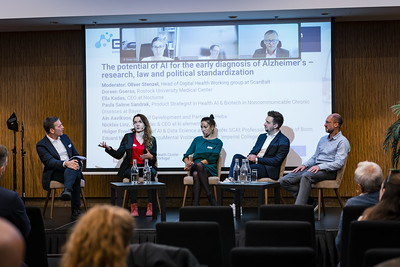 The last panel discussion explored the transformative potential of artificial intelligence (AI) in healthcare, particularly in the early diagnosis and treatment of neurodegenerative diseases and mental health disorders. The panel featured Doreen Goerss from Rostock University Medical Center; Ella Kadas, CEO at Nocturne; Paula Salme Sandrak, Interdisciplinary Product Strategist in Health AI & Biotech for Noncommunicable Chronic Diseases at Bayer; Ain Aaviksoo, Head of Development and Partner at Heba; Nicklas Linz, Co-founder & CEO at ki elements; Holger Froelich, Head of AI & Data Science at Fraunhofer SCAI and Professor at the University of Bonn; and Eduard Maron, CEO at DocuMental and Visiting Professor at Imperial College London and was led by Oliver Stenzel, the Head of the Digital Health Working Group at ScanBalt, the panel brought together experts to discuss the integration of AI innovations and digital tools into healthcare systems.
The last panel discussion explored the transformative potential of artificial intelligence (AI) in healthcare, particularly in the early diagnosis and treatment of neurodegenerative diseases and mental health disorders. The panel featured Doreen Goerss from Rostock University Medical Center; Ella Kadas, CEO at Nocturne; Paula Salme Sandrak, Interdisciplinary Product Strategist in Health AI & Biotech for Noncommunicable Chronic Diseases at Bayer; Ain Aaviksoo, Head of Development and Partner at Heba; Nicklas Linz, Co-founder & CEO at ki elements; Holger Froelich, Head of AI & Data Science at Fraunhofer SCAI and Professor at the University of Bonn; and Eduard Maron, CEO at DocuMental and Visiting Professor at Imperial College London and was led by Oliver Stenzel, the Head of the Digital Health Working Group at ScanBalt, the panel brought together experts to discuss the integration of AI innovations and digital tools into healthcare systems.
AI is revolutionizing healthcare by improving work efficiency, treatment quality, and optimizing existing frameworks. Clinicians are embracing AI as a powerful tool to enhance their ability to provide exceptional patient care. Innovative applications of AI include speech analysis for detecting clinical symptoms, AI-assisted digital twins for Alzheimer’s diagnosis using ATN biomarkers, and retina scans combined with AI analysis for early disease detection.
The panel highlighted the connection between mental health disorders and dementia, introducing a digital mental healthcare system that dramatically reduces patient wait times. AI frameworks mimicking cognitive functions are being developed to combat neurodegenerative diseases. Discussions also explored the potential of AI to identify overlapping risk factors across diseases, potentially transforming primary care by enabling earlier screening for high-risk patients.
While the technology for AI in healthcare exists, several key factors will determine its success. These include collaboration between patients and healthcare professionals, improved data access and integration, incorporation of AI into existing healthcare frameworks, onboarding and education of practitioners, establishment of appropriate regulatory and economic models, and scaling AI solutions across the industry.
The future of healthcare lies in the strategic implementation of AI and digital tools. By fostering partnerships, prioritizing education, and building trust in these innovative solutions, we can unlock the full potential of AI to revolutionize patient care and outcomes.


